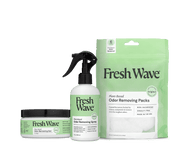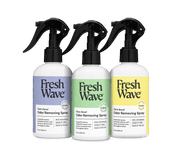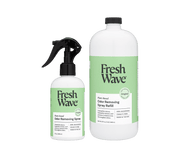A rancid smell coming from your sink makes for a not-so-pleasant backdrop while you’re prepping meals or cooking. If your home is plagued by bad sink odors, then getting to the bottom of their cause is, no doubt, a top priority. In almost all instances of bad-smelling sinks, the culprit lies in components that are stuck in the plumbing that runs from the kitchen sink to the sewer where stuck-on gunk has started to decompose. Unfortunately, this is a problem that will not go away on its own and will likely only worsen with the passage of time. A primer on what causes bad sink odors and how you can eliminate unpleasant odors emanating from the sink, shower, or other drains can be helpful in tackling these types of odors once and for all.
What Causes Bad Sink Odors?
Essentially, anything that goes down your sink or drain can cause a bad odor. This is particularly true in cases where sinks are not used often or when kitchens are not equipped with garbage disposals. Some of the most typical causes of bad odors from the sink include:
- Clogged pipes and obstructed drains. The most common source of stinky sinks are the food and debris that make their way down the pipe, become obstructed, and then begin to rot and decay, emitting foul smells. Bacteria growth at the site of the obstruction can also cause odors to back up the drain and into your kitchen and home.
- Sewer vent clogs. Bad odors from the sink can be due to trapped sewer gas that builds up in the pipes due to clogged sewage vents.
- Dry P-trap. The curved pipe under your sink is meant to hold water that provides a seal from any gasses escaping from the sewer and into your kitchen. If the pipe is dry—usually from some type of obstruction or damage to your pipe—odors can penetrate your home.
How to Get Rid of Those Hard to Eliminate Sink Odors
Even though your sink isn’t clogged and your drain isn’t obstructed, that doesn’t necessarily mean that there is not food, grease, and other gunk clinging to the walls of your pipes – and sending bad odors your way. Removing that built-up ick can help to send the smell packing too. There are a couple of really good ways to get rid of those bad scents coming from your sink.
A timeless remedy for sink odors is to add 2 cups of salt to 2 liters of boiling water. Stir the salt into the hot water until it dissolves, and then pour the boiling hot water down your drain. This method works by dissolving the sludge that’s built up in your pipes and flushing it out of your system. Hopefully, this resolves the bad odor problem so you can restore your kitchen or bathroom to its better-smelling glory days.
If the smell you detect seems to be emitted from your garbage disposal, you can try the baking soda and white vinegar hack. Mix 1 cup of each and simply pour into the disposal. Allow the baking soda and vinegar mixture to bubble in the disposal for around 10 minutes or so. While it’s bubbling—breaking up the stuck-on gunk that’s causing odors—boil a large pot of water on the stove top. When 10 minutes has passed, pour the boiling water down the disposal, hopefully flushing out the root of the odor you smell.
Another twist on the baking soda and vinegar method is to add a large handful of dry baking soda to your disposal and then add a cup of vinegar to the disposal. Wait 15 minutes, then run hot tap water through the disposal, followed by a pot of boiling hot water.
Another odor-busting option is to tap into the power of citrus peels. The skins from oranges and lemons are great for using in the garbage disposal where they cut through the bad-smelling stuff sticking to its inner pipes, including oil, grease, and other residual particulates. Be sure to cut the peels into small pieces prior to adding them to the disposal and then run it as usual. Pieces should be no bigger than a quarter of a lemon.
When cleaning your disposal, don’t overlook its impeller plate and blades. These components naturally get dirty while the unit macerates food, and that built-up food residue and grime can lead to the emission of odors that are quite noxious. A fast fix for cleaning these parts is to drop 2 cups of ice into the sink drain and top it off with a 1 cup of table salt. Turn on the cold tap, then turn on the disposal and allow it to run until it completely crushes the ice. The ice and salt method provides abrasive cleaning that can ensure these parts are not part of your odor problem.
And remember – an ounce of prevention is worth a pound of cure. Take steps now to keep bad sink odors at bay. In the kitchen, scrape dishes to get rid of food before putting them in the dishwasher or washing them by hand. Remove your faucet’s aerator cap, clean away any buildup, and replace. Keep drains smelling fresh and clean by periodically adding baking soda to the drain. And don’t forget to clean the side walls and base of your kitchen sink basin, since dirty dishes can result in dried food residue that can also make your sink smell less-than-fresh.
Use Fresh Wave as Your Odor Eliminator
Eliminating tough odors in the kitchen and elsewhere can be difficult. Thankfully, the revolutionary Fresh Wave Spray formula serves as a diverse deodorizer for all the places in your kitchen where odors lurk. Try Fresh Wave odor-eliminating spray in your garbage disposal or dishwasher, stove or oven, and all kitchen surfaces—anywhere that hard-to-get-rid-of kitchen odors linger. This innovative plant-based odor-removing spray harnesses plant oils and other active ingredients to tackle odors at their source, not just cover them up.






